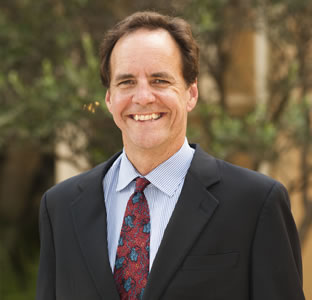UTSA microbiologists discover regulatory thermometer that controls cholera


UTSA researcher Karl Klose and bacterium Vibrio cholerae


UTSA researcher Karl Klose and bacterium Vibrio cholerae
(Sept. 23, 2014) -- Karl Klose, professor of biology and a researcher in UTSA's South Texas Center for Emerging Infectious Diseases, has teamed up with researchers at Ruhr University in Bochum, Germany, to understand how humans get infected with cholera. Their findings were released this week in an article published by the Proceedings of the National Academy of Sciences.
Cholera is an acute infection caused by ingestion of food or water that is contaminated with the bacterium Vibrio cholerae. An estimated three to five million cases are reported annually and 100,000-120,000 people die from cholera infections every year. Cholera patients suffer from dramatic fluid loss and can lose up to 40 liters of fluid from their body in just a few days.
Klose and his collaborators discovered that Vibrio cholerae, which normally lives in oceans and rivers, senses a shift in temperature as it enters the human body through a mechanism called a Ribonucleic Acid (RNA) thermometer. The thermometer detects the higher body temperature of 98.6 degrees Fahrenheit, and then turns on the virulence factors that lead to cholera.
Klose's laboratory showed that interfering with the thermometer prevents the bacteria from causing disease, suggesting possible therapeutic outcomes from this research. The research collaboration stemmed from a long friendship between Klose and Franz Narberhaus, who trained as microbiologists together at U.C. Berkeley 25 years ago.
"The temperature shift is one of the signals that the bacterium uses to turn on the virulence factors, such as the cholera toxin, that cause the disease," said Klose. "We have shown that the bacteria's thermometer controls temperature-dependent expression of the virulence factors. They only express them when they are at body temperature and not at ocean temperature."
"We found that if the RNA thermometer is prevented from working correctly and detecting the right temperature, the bacteria won't cause any disease at all. The organisms will just pass right through the body," explained Klose. "If you can figure out how to disrupt the RNA thermometer in some manner, then you may have a therapy against this disease."
Klose says the long-term goal is to come up with intervention strategies against cholera. Understanding exactly how the bacterium controls the expression of the virulence factors is one step forward in trying to intervene during cholera epidemics.
------------------------------
Connect online with UTSA on Twitter, Facebook, YouTube and Instagram.
Events
You will get the opportunity to learn about the importance of psychopharmacology, common medications for pediatric populations, and best practices for collaborating with health care teams and families.
Virtual EventThe UTSA Veteran and Military Office will be holding a social event for our new military-affiliated students to come out and meet our office, staff, and other students.
MB 0.100, Ground Floor Lobby, Main BuildingThe Student Union invites you to join us for Kickback at the Union, a fun event designed to get you acquainted with all of the services available in the Student Union!
Student UnionInterested in learning more about the different fraternities and sororities in the Multicultural Greek Council? Come meet our organizations and enjoy free food and music.
Retama Galleria (SU 2.02,) Main Campus

